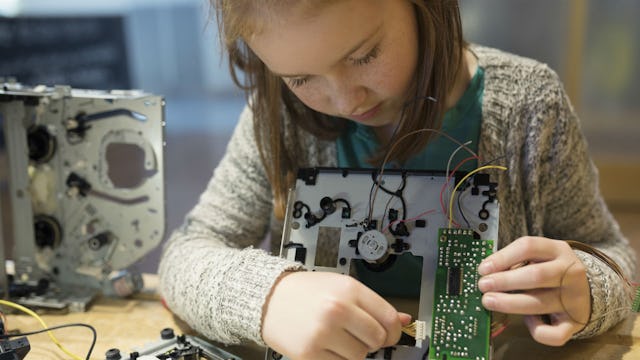Yes, My Gifted Child Has Special Needs

I was a teacher in my former life. For many years, before donning my mandatory SAHM yoga pant uniform, I went to work every day in Ann Taylor clothes, taught Shakespeare and sentence fluency and metaphors versus similes. Then I came home, lesson-planned, graded papers, and did it all over again.
So I know what it’s like to be a teacher, to have 20-something faces staring back at you, each with unique needs. Twenty-something kids with different learning styles and personalities and home lives you know little, if anything, about. I know about budget cuts, followed by budget cuts, and then just when you think there’s no more they can take, more budget cuts. I taught in schools without paper. Without heat. Without air conditioning (but also without windows that open) and without administrative support.
I know what it’s like.
But now I am a parent, on the other side of the table at parent-teacher conferences. Asking you to help my son. And I know that my requests put more work, more stress on you. I get it. But, just like many of your other students, my gifted son has special needs.
What does that mean? It means he’s years ahead of his time. It means he was reading at 2 1/2, doing algebra and fractions in kindergarten, and read the entire Harry Potter series three times by the end of first grade. I’m not bragging. I don’t want any special awards for having a kid like him. These are just the facts. And they scare me.
Because, although I can sympathize with the challenges teachers face, I also know what sometimes happens to gifted kids—kids like my son. Each year I taught high school English, I had at least one or two boys, sitting in desks in front of me, who were brilliant. Boys who could identify the theme, foreshadowing, or motif of a novel well before their peers. Even though I knew they didn’t read it. Even though they put their heads down on their desks, refused to participate, handed in almost no work, and sometimes didn’t even graduate with a high school diploma.
Yet they were the smartest kids in the class.
No one grabbed a hold of them, years ago, before it was too late. No one put their arms on these boys’ shoulders and said, “Your brain is wired differently. And that’s okay. That’s amazing, in fact. But I will not let you waste it. I will not lose you. I will not let you lose yourself.”
No one helped these boys. Boys who should have gone on to college with academic scholarships. Boys who should have attended medical school or MIT or worked for NASA.
I worry about my son. In many ways, he has been bored in school since day one of preschool. And no, I don’t think it is his teacher’s job to cure him of all boredom. Sometimes boredom is a part of life, and we all need to learn that. Hell, I’m bored as shit when he talks about Minecraft for 37 straight minutes, so if anything, learning to face boredom will help him with parenting.
But there’s a fine line between “boredom” and “apathy.” And as his mom, I am determined to save him, to catch him before he falls into the latter. Before he starts to shut down, and stop trying. Before he stops caring about school, as these kids in my classroom had, by 17 and 18 years old.
As explained in an article entitled “Special Needs of Gifted Children,” this is actually a common problem among gifted children. “When children aren’t challenged, then they can’t grow,” the article states. “As a result, they become bored and fidgety. If this boredom becomes part of their daily routine, then children will simply give up hope that school will ever provide them with an avenue for exploring curiosities or trying new things. When this hope no longer exists, children lose the motivation to participate in classroom activities and may lose the desire to attend school at all.”
So what does that mean? It means I advocate. It means I am in the classroom from time to time, watching how he interacts with other students, monitoring what his curriculum looks like. It means extra efforts on my part at home—research projects, trips to the library, and hands-on activities. It means driving to and from science camps and math clubs, and networking to find him friends who have similar interests.
But we parents of gifted kids need your help, teachers. The National Association for Gifted Children says, “Parents, educators, and the broader community have a responsibility to support all children as they reach for their personal best. It is essential to support the growth and development of the whole gifted child including their intellectual, social, emotional, and physical domains.”
Furthermore, NAGC adds, “Teaching gifted children may require special strategies like acceleration, flexible ability grouping, and specialized pull-out programming.” We’ve experimented with all of these teaching strategies, learning what works best for him, the teacher, and the rest of the class. He’s had an IEP in the past, individualized reading and math programs, extra computer time, and higher level projects assigned to him. And each year, each semester, we will continue to all work together to make sure my child is thriving.
My son is not homeschooled. He is not skipping a grade. He hops on the bus every morning and attends third grade at our local public school, where he eats hot lunch (corn dog is his fave), plays Four Square at recess, and loves P.E. He wears Under Armour sweatpants and hoodies and loves video games, just like the rest of the 9-year-old boys in his class.
He’s just gifted. So if you are lucky enough to have him on your class roster, you’ll get to know me too. Because I’m his mom. And that’s my job.